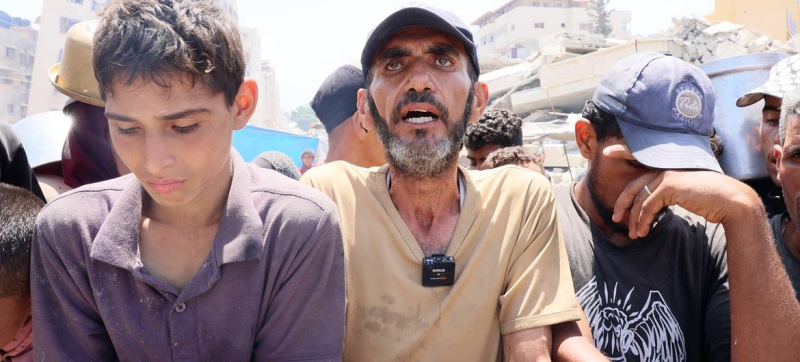- Death toll from central Israel strike rises to 5 |
- DSE sinks 138 points on broad sell-off; CSE also tumbles |
- Inside story of a roommate murder after quarrel in Dhaka |
- Jamaat condemns Khamenei’s killing, holds protest rally in Dhaka |
- Iran to pick next supreme leader in ‘one or two days’ |
Gaza Hunger Crisis: ‘We Are Dying for Food and Water’

Bassam Abu Odeh, a displaced person from Beit Hanoun in western Gaza City.
In western Gaza City, displaced people live crammed into makeshift tents, as a human tragedy unfolds across a landscape gripped by hunger.
Earning a living has become a daily struggle, with hundreds of men, women, and children standing in endless queues under the scorching sun outside the few remaining community kitchens, which serve nothing but lentil soup.
A community kitchen in western Gaza presents a panorama of pain and despair as displaced people plead for help and make urgent appeals to the world to end their suffering.
Workers are busy preparing lentil soup while plastic bowls and empty plates pile up behind an iron fence—many may not even get a sip.
After a bitter struggle, Ziad Al-Ghariz, an elderly displaced man, managed to obtain a cup of lentil soup. Sitting on the floor, he took slow sips and told UN News that he had not tasted bread in 10 days.
“I eat the lentil soup distributed by the community kitchen,” he said. “I cannot afford flour at all. I rely on whatever the kitchen provides. The people of Gaza are hungry.”
Young Mohammed Nayfeh said he spent four hours waiting for a meal for his family.
“I've been standing here for four hours, and I can’t get any food in the crowds and heat,” he said. “We’re dying. We need support. We need food and water. Where is the world? Every day we eat only lentils. No flour, no food, no water. We’re dying of hunger.”
"Either we burn in the sun or get trampled underfoot," said Umm Muhammad, a displaced resident from the Shujaiya neighbourhood.
“There is no water, no food, no bread,” she said. “The hardship forces us to come here, but we return with nothing. We either get burned by the sun or trampled in the overcrowding. And no one listens.”
Hussam al-Qamari, also displaced from Shujaiya, said the situation is unbearable.
“We are dying, and our children are starving to death,” she said. “So much is happening to Gaza’s people—much of it unacceptable. An old man like me has stood here since morning holding a bowl, hoping to feed his children, but they still haven’t eaten.”
According to the UN Relief and Works Agency for Palestine Refugees (UNRWA), one in five children in Gaza City is malnourished, with cases rising daily.
The image of a little girl standing behind an iron fence, holding an empty bowl waiting for lentil soup, captures the horrifying tragedy children are bearing.
Bassam Abu Odeh, a displaced resident from Beit Hanoun, made an emotional appeal.
“We call on all free people and peace lovers to help provide food and water until this famine imposed by the occupation ends. The trucks allowed in by the occupation are a drop in the ocean of need. We have no one but God.”
Umm Rami, from the Zeitoun neighbourhood, said life’s basic necessities are absent in Gaza and appealed to the world for compassion.
“I came here to get a small amount of food for my children. This is our new reality—we come to kitchens for food, though we once lived with dignity in our own homes.”
She added: “Food is not enough. We stand in lines for food and water. Children’s lives now revolve around these lines. We have only God. The world must awaken its conscience.”
The Integrated Food Security Phase Classification (IPC) warned that Gaza faces a severe risk of famine, with food consumption and nutrition indicators at their worst since the conflict began.
Two of the three famine thresholds have already been observed in parts of Gaza, according to the alert, while the World Food Programme (WFP) and UNICEF warn time is running out for a comprehensive humanitarian response.
The UN Secretary-General said Gaza is on the brink of famine, calling it a humanitarian catastrophe of epic proportions.
“This is not a warning—it’s a reality unfolding before our eyes,” he said, urging that the trickle of aid must become “an ocean” of food, water, medicine, and fuel.
“This nightmare must end,” he declared.
The UN Office for the Coordination of Humanitarian Affairs (OCHA) reported that even after tactical pauses by Israeli forces, casualties continue among those seeking aid, with deaths from hunger and malnutrition increasing.
Parents continue to struggle to save their starving children. Desperate crowds unload small aid shipments from trucks that manage to pass through the crossings.
Although the UN and partners are using every opportunity to deliver assistance, OCHA says conditions remain far from sufficient for proper aid delivery.

